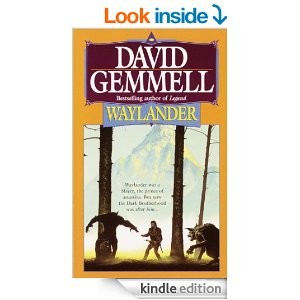 I was an avid reader as long as I can remember, from reading The Hobbit in 3rd grade to reading so much in middle school that my teachers started confiscating my books. I devoured everything I could get my hands on, and that love of reading helped spark my interest in writing down my own stories.
I was an avid reader as long as I can remember, from reading The Hobbit in 3rd grade to reading so much in middle school that my teachers started confiscating my books. I devoured everything I could get my hands on, and that love of reading helped spark my interest in writing down my own stories.
When I think back to stories I really loved, ones that perhaps are not so well known and yet are still ones that powerfully impacted me, one novel immediately popped into my head: Waylander by David Gemmell.
I picked up this novel in a bookstore in Sydney, Australia in 1990 and it sucked me in even though up to that point I preferred more traditional heroes. Most of the time I’ve found that authors just could not pull off a successful deeply flawed anti-hero. They usually came across as unbelievable, or depressing, or just plain uninspiring, so I was surprised to get so deeply sucked into Waylander.
Waylander, the main protagonist, is a ruthless, heartless killer who embraced anger and thirst for revenge when his family was murdered many years ago, and who seems to have lost any chance of ever feeling joy again. And yet the story depicts with a deft touch his journey toward redemption, his reluctant shift back across the line to hero.
What really makes the story work however is the supporting cast of characters, all of whom carry significant flaws, and all of whom face their own very real arcs of growth within the story. I think this was the first book that coupled a great anti-hero with complex supporting characters and opened the door for me to see there is so much more that can be done than many authors I had read bothered to do.
- First there’s Dardalion, the oh-so-pure priest who sacrifices some of his own self-assured goodness helping Waylander and earns a bit of grit in return.
- Then there’s Danyal, a woman who faces the destruction of her homeland with courage, a survivor who possesses the raw will to live, the courage to withstand whatever tragedies might strike. Together, she and Waylander might provide the missing element in each others lives, but do they dare risk opening their hearts to allow affection to grow?
Other characters proved just as fascinating, but you can read the book to learn about them. The story also included some great twists like:
– Can the assassin who murdered the king and pushed the kingdom to the brink of collapse under the weight of invading armies really be trusted to secure the one weapon powerful enough to turn the tide?
– What happens to a villain when offered a chance to be a hero for a change?
– How will an assassin respond when his quarry neither flees nor turns to fight?
– How do you defeat werewolves who will starve to death unless they eat the flesh of their appointed victim?
It’s not the best book ever written, but I loved it. It contained plenty of depth to open a few doors to a teenager just beginning to explore writing his own stories. For that, I’ll always consider this book an all-time favorite.
It’s funny, I never even knew the author had written other books in the series until I looked this one up recently to buy another copy. I might just have to read the sequels, and I definitely plan to re-read Waylander again very soon.
It’s great to visit old friends sometimes.

BS low – ralttnaiioy high! Really good answer!